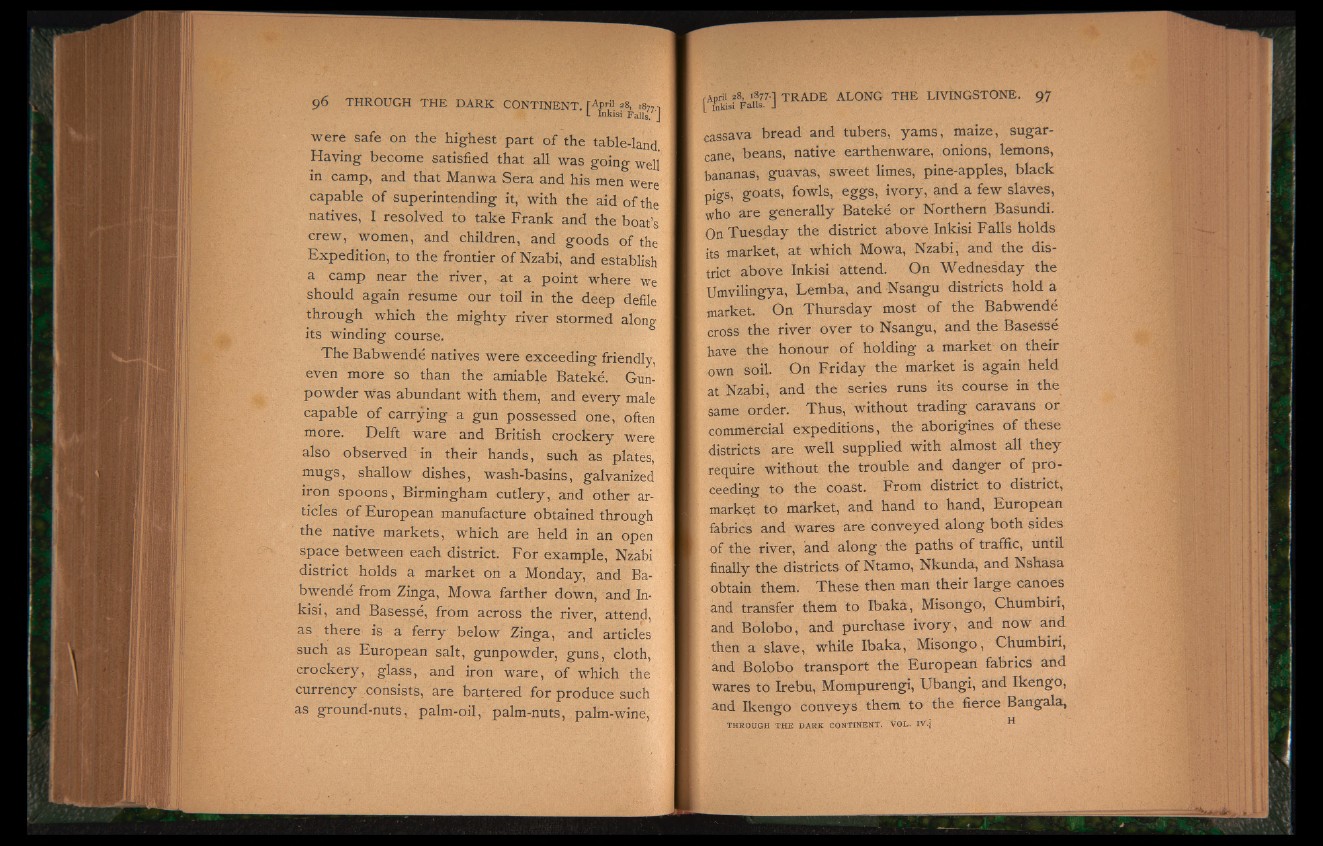
were safe on the highest part of the table-land.
Having become satisfied that all was going well
in camp, and that Manwa Sera and his men were
capable of superintending it, with the aid of the
natives, I resolved to take Frank and the boat’s
crew, women, and children, and goods of the
Expedition, to the frontier of Nzabi, and establish
a camp near the river, at a point where we
should again resume our toil in the deep defile
through which the mighty river stormed along
its winding course.
The Babwende natives were exceeding friendly,
even more so than the amiable Bateke. Gunpowder
was abundant with them, and every male
capable of carrying a gun possessed one, often
more. Delft ware and British crockery were
also observed in their hands, such as plates,
mugs, shallow dishes, wash-basins, galvanized
iron spoons, Birmingham cutlery, and other articles
of European manufacture obtained through
the native markets, which are held in an open
space between each district. For example, Nzabi
district holds a market on a Monday, and Babwende
from Zinga, Mowa farther down, and Inkisi,
and Basesse, from across the river, attend,
as there is a ferry below Zinga, and articles
such as European salt, gunpowder, guns, cloth,
crockery, glass, and iron ware, of which the
currency consists, are bartered for produce such
as ground-nuts, palm-oil, palm-nuts, palm-wine,
rApril 28, 1877.1 TRADE ALONG THE LIVINGSTONE. 97
[ Inkisi F a l ls . J
cassava bread and tubers, yams, maize, sugarcane,
beans, native earthenware, onions, lemons,
bananas, guavas, sweet limes, pine-apples, black
pigs, goats, fowls, eggs, ivory, and a few slaves,
who are generally Bateke or Northern Basundi.
On Tuesday the district above Inkisi Falls holds
its market, at which Mowa, Nzabi, and the district
above Inkisi attend. On Wednesday the
Umvilingya, Lemba, and Nsangu districts hold a
market. On Thursday most of the Babwende
cross the river over to Nsangu, and the Basesse
have the honour of holding a market on their
own soil. On Friday the market is again held
at Nzabi, and the series runs its course in the
same order. Thus, without trading caravans or
commercial expeditions, the aborigines of these
districts are well supplied with almost all they
require without the trouble and danger of proceeding
to the coast. From district to district,
market to market, and hand to hand, European
fabrics and wares are conveyed along both sides
of the river, and along the paths of traffic, until
finally the districts of Ntamo, Nkunda, and Nshasa
obtain them. These then man their large canoes
and transfer them to Ibaka, Misongo, Chumbin,
and Bolobo, and purchase ivory, and now and
then a slave, while Ibaka, Misongo, Chumbiri,
and Bolobo transport the European fabrics and
wares to Irebu, Mompurengi, Ubangi, and Ikengo,
and Ikengo conveys them to the fierce Bangala,
THROUGH THE DARK CONTINENT. VOL. IV.j -H